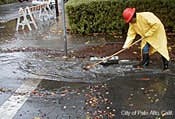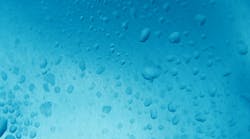Have you ever wondered where the oil goes that makes driving so dangerous after the first rainfall? Or what happens to the detergent that runs down the driveway when you wash your car? The used oil, as well as detergents, dirty water and soaps from washing your car, are carried through city drains into the nearest lake, stream, bay or ocean.
Anything dumped or dropped on the ground or in the gutter can end up in the nearest body of water. Stormwater pollution results from materials and chemicals washed into the storm drains from streets, gutters, neighborhoods, industrial sites, parking lots and construction sites. This type of pollution is significant because, unlike the water that goes down a sink or toilet, stormwater is untreated and flows directly to a lake, river, or the ocean.
Stormwater systems were originally intended to route rainwater quickly off the streets during a heavy storm. Unfortunately, these systems can carry pollutants such as pesticides, bacteria and chemicals through city streets and straight to our waters. Stormwater pollution can include chemicals, fast food wrappers, cigarette butts, Styrofoam cups, sewage overflow, cooking oil, bacteria from pet waste, used motor oil, fertilizers, paint and construction debris.
Used oil from a single oil change can pollute up to one million gallons of freshwater. Improper disposal of used oil, which includes oil leaking from cars, contributes significantly to stormwater pollution. The EPA estimates that American households generate 193 million gal. of used oil every year, and improperly dump the equivalent of 17 Exxon Valdez oil spills every year.
And household cleaners can hurt the environment as well, if not disposed of properly. One ounce of household bleach requires 312,000 oz. of water to be safe for fish. Even biodegradable soaps can pose problems for aquatic life — in order for one ounce of biodegradable detergent to be safe for fish, it needs to be diluted by almost 20,000 oz. of water.
Why is stormwater pollution so bad?
As polluted water makes its way to the oceans, water quality can be affected, which often results in the closing of local beaches due to unhealthy water conditions. Stormwater carries disease-causing bacteria and viruses. Swimming in polluted waters can make you sick. A study in Santa Monica Bay showed that people who swim in front of flowing storm drains are 50% more likely to develop certain symptoms than those who swim 400 yards from the same drain. Illnesses generally associated with swimming in water contaminated with urban runoff include earaches, sinus problems, diarrhea, fever and rashes. Polluted stormwater can also hurt aquatic life. Cigarette butts, the number one most littered item in America, have been found in the stomachs of fish, birds, whales and other marine creatures that mistake them for food. The plastic loops that hold six-packs of beer or soda together can strangle seabirds.
The EPA controls stormwater pollution at industries and construction sites by inspecting sites and enforcing the agency's requirements. The EPA also conducts comprehensive audits of municipal stormwater programs to ensure cities are reducing stormwater pollution from all sources within their jurisdictions. A significant amount of stormwater pollution is caused by everyday human activities – washing and maintaining cars, littering, watering lawns, etc. There are many simple, basic steps that can be taken to prevent storm water pollution:
* Don't dump waste into storm drains
* Keep yard clippings out of the street
* Dispose of household chemicals properly by following the directions on the package or by calling the local public works department for proper disposal guidelines
* Clean up oil spills and fix leaking automobiles
* Use drip pans to catch engine oil and other pollutants while repairing cars
* Recycle used motor oil
* Sweep driveways clean instead of hosing them down
* Water your lawn by hand, or adjusted sprinklers to avoid over-watering. If any water flows off your lawn, you're using too much water.
* Wash your car at a commercial car wash, or at least wash your car on an unpaved surface so the excess water can be absorbed by the ground.
* Drain swimming pools and spas into a sanitary sewer outlet, never into a street. Check first with your local wastewater treatment plant before disposing of anything in the sewer.
Source: EPA


